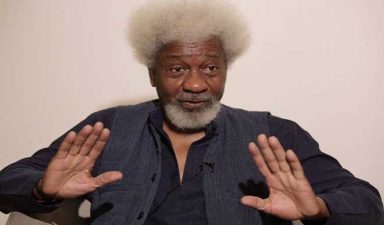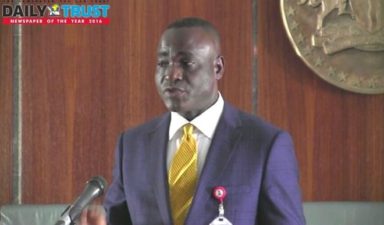Plateau State Governor, Simon Lalong, has said he advised his Benue counterpart, Sam Ortom, to tread softly about enacting anti-grazing law.
Speaking with State House reporters yesterday after a meeting with President Muhammadu Buhari, Lalong said he had told Ortom to put other measures in place first.
Recently, herdsmen had reportedly killed scores of people in Benue State communities.
He said: “I told the governor of Benue when he was doing the law, I said look, why don’t you tread softly, just be careful, take other steps before you start implementation.
“But you see, states are different, his own concepts are different and for us on the Plateau is different.”
Lalong said he would not make such a law without developing the ranching areas. “I cannot go and say I put in law, to stop who? If I stop the people, what is the alternative?
“Ranching as a concept is a policy and there are states realizing the importance of the policy. I cannot wake up like some people said last year that I should go and do anti-grazing law. And I asked: anti-grazing law for what?
“We are talking about ranching, we are talking about development of livestock business and I cannot use the word ‘anti’ to start driving people who are interested. It is for those who are interested to come and get involved in it.
“Secondly, I can’t implement anti-grazing law. There are levels of implementation which will require government intervention, provision of ranchers and thirdly, when you’re talking of ranching, it’s a component of agricultural business, you’ll also require subsidy.
“Subsidy must come from federal and state governments and by the time we develop it and put every structure on ground, then we can bring laws to regulate the implementation. So, I don’t want to jump one step before the other.”
He also said he was convinced that the Federal Government’s plan to establish cattle colonies would help resolve the perennial crises between farmers and herdsmen.
‘For me, anytime I hear anything about agriculture, I don’t jump into conclusions, I go and study it. Yesterday (Wednesday), I was at the federal ministry with my agricultural team, commissioner and others, we spent almost five hours because I said they must convince me and explain to me what colony is so that when I go back just like I did with ranching, I will go and tell my people that this is the concept.
“When I had the briefing with them, I was convinced about colony.
“They said the difference between colony and ranches is that one is bigger than the other. You get a very big field, you get investors, demarcate the area, somebody will ranch bees, somebody will ranch goats, somebody will ranch cattle but government will develop the place put grasses, water and anybody who is coming in must pay.
And you cannot go and force any land, is voluntary land that government has.
“So, they are saying they are going to visit the place as part of the solution to farmers/herdsmen clashes in my state.”
He said when some people demanded for an anti-grazing law, “I asked against whom and they said against a particular tribe. And I said tell me who in Plateau is not into open grazing.
“In Seventeen local governments, we are all into open grazing. It is either you are grazing cattle, goat, sheep, or even chickens because the law will protect and restrict the movement of all these animals, they are general livestock.”
He said the state government was taking a holistic approach to the issue in addition to a lot of consultation. He said he had heard that the Fulanis were moving from states to states to sensitize their people on the need to embrace ranching.
“Let me tell you, nobody said ranching is only for Fulani herdsmen … Many youths, thousands of graduates are ready to go into that business.
“We must help the federal government to find ways of addressing issues because agriculture is not just agriculture now, it is now a means of diversification. And if you have to diversify, it is serious business for everyone is not for a tribe. So, I said if we have to encourage people to go into ranching I will not use the word ‘anti’.
He said though he inherited a protracted crisis in the state, he had achieved peace by accommodating divergent interests.
“Within three months, we were able to achieve peace in Plateau State. Most of the lingering crises were between farmers and herdsmen in Plateau but today, in most parts of the state, you will see beautiful relationship between herdsmen and farmers.
“At the end of last year, something small happened, but I’m not saying it was between herdsmen and farmers, it was as a result of criminal activities and so we focused on fishing out those criminals. Most of the crisis that happened was not on the farm, it was just pockets of people, Christians and Muslims killing one another and so we addressed those issues, we are handling it.”
Lalong said he visited President Buhari to brief him on the security situation in Plateau and to seek a shift of date of his visit to the state from January to February and that the president had agreed.
Lalong, Ogbeh discuss cattle colony initiative
On Wednesday Governor Lalong met the Minister of Agriculture and Rural Development, Chief Audu Ogbeh during which he was briefed about the cattle colony initiative.
He said he was in the ministry to identify with the agricultural revolution of the Federal Government in area of livestock production as well as seek for more assistance for his state.
The Governor said Plateau State was one of the states that keyed into the ranch policy when it was introduced by the Federal Government. He said the state expressed the readiness to also embrace the cattle colony policy that is being introduced by the Federal Government.
“If you need to live in peace you need to find ways of sustaining peace. This policy has a lot of interest for us”, he stated.
He he was happy with the support the state enjoyed so far from the Ministry and promised that Plateau state would continue to partner with the Federal Government in its agricultural policies to provide gainful employment for its teeming populations.
In his remarks Chief Ogbeh said: “We have no choice than to help grow agriculture in all states of the federation, create wealth and jobs and make people happier to bring life to the rural areas where there has been so much hardship and difficulty in accessing livelihoods.”
He explained that the introduction of cattle colonies in the country was borne out of the need to provide an enabling environment for agriculture to thrive in the country.




